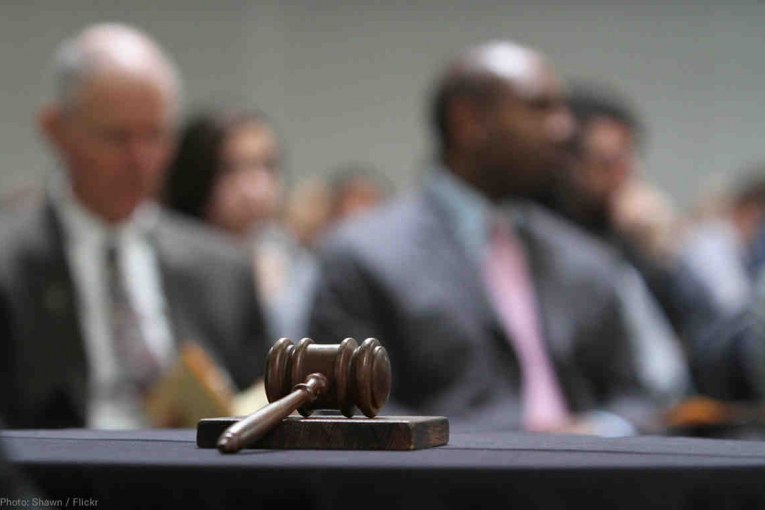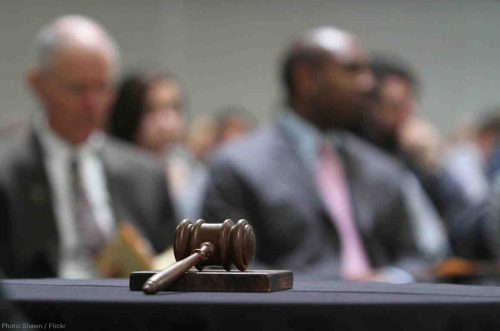

By Ashley Sawyer
Have you ever watched an episode of “Law & Order”? The creators do an amazing job of dramatizing the court process. The characters playing the prosecutors are always eloquent and passionate as they go toe-to-toe with an indignant defense attorney who is quick to counter every point. We see this version of the trial process all the time in mainstream media. The real life, everyday version is much different. My real-life experience was much different.
Like millions of others in this country, my experience didn’t involve expensive defense lawyers, just overworked and underpaid public defenders. There were no passionate arguments from the prosecutors because over 90 percent of all cases end in a plea agreement, as mine did. I was convicted in 2015 for two felonies and a few subsequent misdemeanors. My felonies were fraud-based charges for cashing checks that weren’t mine. My misdemeanors included things like attempted retail theft, trespassing, and a couple other minor things.
I did not walk into that courtroom a hardened criminal, and I had never been to jail. My real crime was addiction. Like many others, I was a heroin addict and committed these low-level crimes to support my daily use. My addiction, as that of many women, spurred from serious trauma, including sexual and domestic violence.
The agreement between my public defender and the prosecutor was to be a one- to three-year sentence. My time before the judge came, and the prosecutor informed him that we did not have an agreement: They were asking for a two- to six-year sentence. The emotions I felt in that chair, shackled by the waist and ankles, are difficult to put into words. I was at the complete mercy of  that prosecutor. Luckily for me, the judge thought the plea agreement was unreasonable. My final plea: 14 months to four years.
that prosecutor. Luckily for me, the judge thought the plea agreement was unreasonable. My final plea: 14 months to four years.
The word “agreement” makes it sound like you agree to a plea deal, but that is not exactly the case. While I was informed I had the right to a trial, I was strongly dissuaded from exercising that right. While I could have waited to bring my case before a judge and jury, I would have faced the maximum sentence available, which would have been 10 years in prison. In my case, the plea deal was presented as my only hope of seeing my children, getting treatment for my addiction, and moving forward. This is the weight of the prosecutors’ power that I experienced first-hand — the leveraging of my life, my children, and loved ones against me.
The prosecutor is the most powerful person in the world of anyone facing criminal proceedings. They have the power to impose a wide array of sentences on individuals facing conviction, and those sentences are often just the start of a life-long navigation of collateral consequences, not just for the person who is convicted, but for anyone connected to them.
I have served my sentence and become a responsible, tax-paying, and positive member of my community. I returned to college to pursue a degree in behavioral science. I volunteer with a transitional housing program, and I have become an advocate for criminal justice reform. I am an active mom and partner.
But regardless of any achievement or level of recognition I acquire, I am a convicted felon. When I apply for jobs, I am flagged as a “high-risk” employee due to my theft convictions and have had difficulty finding even minimum-wage employment. When my own children have school field trips, I am barred from being a chaperone.
Those are just a couple examples of the long-lasting collateral damage caused by incarceration, and things could have gone differently. The prosecutor in charge of my case could have used a diversion option, like treatment court, or a different form of supervision that would have allowed me to address my addiction, options which would have minimized the impacts I still feel on my life today. I have since been told my sentence was extreme and that the prosecutor could have easily diverted me to a treatment court program or community supervision to address the underlying reasons for my addiction and subsequent crimes.
Around the country, voters are beginning to realize that the old “tough on crime” model does not promote safer or healthier communities. My own life has proven this. Prison should not be the automatic answer. The community is not “safer” today because I went to jail. I’m successful today because of support, treatment, and opportunity — none of which I found in jail.
Prosecutors have immense power and use that power, with little public accountability, to make choices that change the lives of real people, like me. This is why it is so important for voters to know who their local prosecutor is and where they stand on criminal justice reform issues. The ACLU’s Smart Justice Campaign is putting a focus on prosecutors. You have the power to change our culture of mass incarceration by electing prosecutors that care more about people than conviction rates.
Ashley Sawyer is a Campaign for Smart Justice Consultant for ACLU of Vermont
Get Tickets To Vanguard’s Immigration Rights Event
Way to take no responsibility for your actions Ashley. You stole some stuff and people are reluctant to trust you. Clearly the fault of the prosecutor!
“little public accountability” They are not elected in Vermont?
“The agreement between my public defender and the prosecutor was to be a one- to three-year sentence. My time before the judge came, and the prosecutor informed him that we did not have an agreement: They were asking for a two- to six-year sentence. The emotions I felt in that chair, shackled by the waist and ankles, are difficult to put into words. I was at the complete mercy of that prosecutor. Luckily for me, the judge thought the plea agreement was unreasonable. My final plea: 14 months to four years.”
Yeah, clearly the fault of the prosecutor… Let’s see. They had an agreement on a 1-3 year sentence. First time offense. Prosecutor reneges. Judge overrules the prosecutor (very rare), and imposed a 14 month sentence.
She did take responsibility for her actions – she didn’t deny the crime, didn’t deny that she should have punishment, disagreed with the way the prosecutor handled it. I don’t blame her.
So many things wrong with this article, like all the fake ACLU advocacy stuff, but do not have time to elucidate.
First of all a person facing theft and bad check charges in VT is unlikely to be “shackled by the waist and ankles” so she lost me there.
“unlikely to be “shackled by the waist and ankles” so she lost me there. ”
Really? Do you know if you are in custody in Yolo County what happens – they have their arms shackled to their waste and a connector to the ankles. If you don’t make bail, it doesn’t matter what you are in for. The only time you wouldn’t be shackled in Yolo and in custody is with a jury present. So it sounds pretty consistent with what we have in Yolo County.
To have oneself shackled to “their wastes” is deeply disturbing… sounds like ‘cruel and unusual’… did the judge call in for fans to “clear the courtroom” of noxious odors?
Sorry, yeah, ‘too easy’… watching the news, needed comedy relief… mea culpa…
Moderator… feel free to expunge…
Ask them the case number and prosecutors name. I’ll call and ask about the other side of the story.
Nope.
This is victim posturing.
As clear sign that the accused did not and does not “get it”… which probably explains the Prosecution’s change in decision on the plea.
Jeff, the whole article reeks of falsehood like most of the ACLU advocacy stuff and clearly the intended audience is not-too-bright.
“The agreement between my public defender and the prosecutor was to be a one- to three-year sentence. My time before the judge came, and the prosecutor informed him that we did not have an agreement: They were asking for a two- to six-year sentence. The emotions I felt in that chair, shackled by the waist and ankles, are difficult to put into words. I was at the complete mercy of that prosecutor. Luckily for me, the judge thought the plea agreement was unreasonable. My final plea: 14 months to four years”
Say what? What happened to the PD? While it’s possible it sure smells funny and it seems way too vague.
“My real crime was addiction”
The folks who checks you were cashing opr whose stuff you stole may disagree with that analysis.
“I was strongly dissuaded from exercising that right.”
By who? Too bad she was not in Yolo, she would have had a trial
“The prosecutor in charge of my case could have used a diversion option”
Too bad she wasn’t in Yolo…
Most of the Vanguard articles written by ACLU employees appear to be fiction intended to influence a political direction. I think that is the same as propaganda.
Actually I have found the articles written by the ACLU to be fairly accurate when I have had to fact check them. Jim has pointed out several objections that if he were familiar with court proceedings, he wouldn’t have raised. That’s a big problem – reality is actually in some ways so warped that people mistake reality for fiction.
Actually Jim, just as you didn’t respond to my point earlier, you really do not know what you are talking about. You called bs on the restraint system that she descirbed – the same system is used in Yolo. I pointed this out. Nada from.
Here is another perfect illustration: “Say what? What happened to the PD? While it’s possible it sure smells funny and it seems way too vague.”
What do you mean? I know exactly what she was describing, because the situation comes up in court. Basically, the defense and prosecution had come to a plea agreement. Or at least the defense thought they had. But the prosecutor either never agreed or changed their mind. But the judge made an agreement with the defense, they plea to the sheet and the judge uses their discretion to impose a sentence. It doesn’t happen very frequently, but it does happen.
There is nothing that smells funny about it because it happens often enough. If you were familiar with court proceedings you would know this.
“First of all a person facing theft and bad check charges in VT is unlikely to be “shackled by the waist and ankles” so she lost me there.”
Wow it’s really weird, there was a lady in Yolo yesterday afternoon. She was in custody. She was arrested for fraud – she took the lady who she was a caregiver for’s credit card and used it without permission. She was shackled with her hands to her waist. There was a connector to her ankles and her ankles were shackled as well. This was in Woodland. How can it be, Jim assures us that this would not happen. To quote him, “she lost me there.” Every other in custody had the same thing. Newsflash: JIM DOESN’T KNOW WHAT HE’S TALKING ABOUT